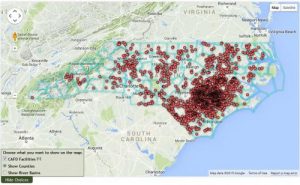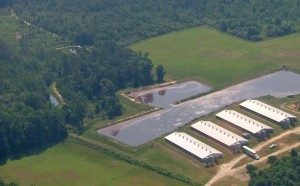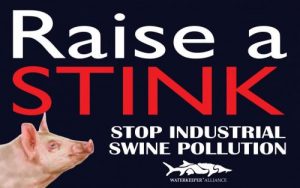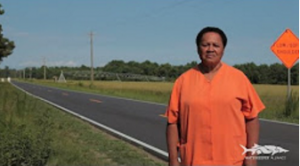Pure Farms Pure Waters
Industrial Farming And Its Impact On Our Waterways
Working in partnership with WATERKEEPER® ALLIANCE, our North Carolina Waterkeepers, and other stakeholders, we continue to call attention to the destructive pollution practices of industrialized meat production, ensuring compliance with environmental laws, and supporting the traditional family farms that industrial practices endanger.
Winyah Rivers Alliance participates in the NC Pure Farms Pure Waters Campaign, designed to address the environmental and public health impacts of industrial animal agriculture from the mountains to the coast. The integration of watershed-specific strategies, informed by local expertise and designed around shared aims, is the key to our success.

This map, created in partnership between Waterkeeper Alliance and Environmental Working Group, reveals the locations of more than 6,500 CAFOs (Confined Animal Feeding Operations) across the State.
Southeastern NC is home to the heaviest concentration of swine in the country, while poultry operations are wide and expanding statewide, and dairy facilities are primarily located in the western part of the state.
NC’s Lumber River Basin is home to 201 swine CAFOs (Confined Animal Feeding Operations, CAFOs, and also known as factory farms and industrial meat production facilities) and an ever growing number (393% increase from 1992-2014) of poultry CAFOs.
Our team of Riverkeepers gathers evidence of water quality pollution caused by animal waste runoff from land application (sprayfields) and report noncompliance to state officials. We work as part of a coalition of stakeholders to end this antiquated and improper waste management practice and to push for implementation of superior technologies to treat animal waste.
With our Waterkeeper colleagues, we are developing a partnership to promote sustainable meat producers across the State. Our work contributes to the statewide dialogue about animal waste management and water quality protections across North Carolina.
Video Series: The True Cost of Industrial Meat Production
The True Cost of Industrial Meat Production campaign aims to raise awareness of environmental injustices being perpetrated against North Carolina’s most vulnerable populations and features powerful, first-hand accounts of community members, esteemed scientific experts, and local people on the ground. This campaign shows the devastating impacts to public health, quality of life, and local waterways caused by industrial animal agriculture.
Background:
Industrial meat production facilities, confining thousands of animals in industrial-like conditions, routinely violate the Clean Water Act, damaging the health of communities and waterways while destroying the independence of generational farmers.
These operations, which tend to be geographically concentrated around the industry processing facilities and feed mills, can produce as much waste as a small city, but without the most basic waste treatment system to process it. As a result, the facilities frequently dispose of untreated animal sewage on adjacent lands in excess of the amounts needed for crop production and discharge that waste into local waterways in violation of the Clean Water Act, contaminating water resources and damaging the health of downstream communities.

In North Carolina, we are working with Waterkeeper Alliance and other NC Riverkeepers to implement an unprecedented strategic, state-wide campaign to regulate pollution from multinational and national corporate-controlled swine, poultry and dairy facilities, which are devastating rivers, lakes and estuaries across North Carolina.
Our method includes:
- Targeted investigations
- Grassroots advocacy
- Enforcement actions against North Carolina CAFOs
- Administrative challenges to state and federal regulatory schemes
- Strategic partnerships; and
- Coordinated advocacy efforts with other state and national organizations
Our goal is to stop and cleanup water pollution caused by the concentration and waste management practices of swine and poultry operations by forcing government agencies to properly regulate and enforce their procedures. We support food production systems that do not harm water quality, communities and farmers, and hold agribusiness corporations responsible for waste management solutions.

